
29 August, 2023
How Eco-Friendly Keyrings Are Transforming Hotel Promotions
As the global awareness of environmental issues continues to rise, so does the hospitality industry's commitment to sustainability. Hotels, in particular, are taking proactive measures to reduce their ecological footprint and promote eco-conscious practices. One significant area of focus in this endeavour is the adoption of eco-friendly promotional items, such as keyrings made from recycled or biodegradable materials. This blog delves into the growing trend of sustainability in the hotel industry, highlighting how eco-friendly promotional keyrings transform how establishments engage with guests and positively impact the environment.
The Rise of Eco-Consciousness in the Hotel Industry

There has been a noticeable shift in consumer behaviour in recent years, with a growing emphasis on environmental responsibility. Travellers, in particular, seek accommodations aligning with their eco-conscious values. As a result, hotels are under increasing pressure to implement sustainable practices throughout their operations. From energy-efficient lighting to water conservation initiatives, these establishments actively seek ways to reduce their environmental impact and contribute positively to their communities.
Promotional items have long been a popular marketing strategy in the hospitality industry. These souvenirs serve as mementos for guests and act as brand reminders long after their stay has ended. However, the environmental impact of traditional promotional items, such as plastic keyrings, has come under scrutiny. In response to this concern, hotels are exploring more sustainable alternatives that can effectively communicate their commitment to environmental stewardship.
The Eco-Friendly Promotional Keyring Advantage
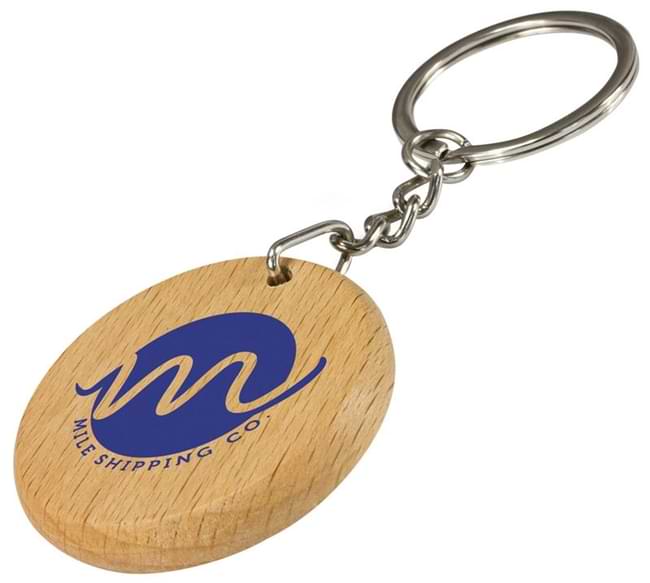
Eco-friendly promotional keyrings made from recycled or biodegradable materials offer a multitude of advantages over conventional plastic keyrings. These eco-conscious choices reflect the establishment's values and resonate with guests who prioritise sustainability. Here are some key benefits of using eco-friendly promotional keyrings:
a. Reduced Environmental Impact: Reducing the environmental impact has become a pressing concern for businesses across various industries, including the hospitality sector. As hotels increasingly strive to operate in an eco-conscious manner, the choice of promotional keyrings made from recycled materials or biodegradable substances plays a pivotal role in reducing their carbon footprint and aligning with global sustainability goals.
Choosing promotional keyrings made from recycled materials exemplifies the principles of the circular economy. Rather than relying solely on virgin resources, hotels actively participate in closing the resource loop by using materials that have already undergone their first life cycle. This practice reduces the demand for new raw materials and helps decrease the energy consumption and emissions associated with traditional manufacturing processes.
Also, the prevalence of plastic pollution has become a significant environmental concern. By opting for keyrings made from recycled materials, they demonstrate a commitment to combating plastic waste. These keyrings effectively divert plastic from landfills and oceans, mitigating the harmful impacts of plastic pollution on marine life and ecosystems. By choosing keyrings made from recycled materials or biodegradable substances, hotels actively reduce their carbon footprint. This contributes to global efforts to mitigate climate change and supports the transition to a low-carbon economy.
Establishments that adopt keyrings made from eco-friendly materials send a powerful message to their guests and stakeholders. It showcases the establishment's commitment to environmental responsibility and sustainability. Guests are increasingly mindful of their environmental impact and are more likely to support and appreciate businesses that prioritise green initiatives. Sustainability is no longer just a corporate social responsibility initiative; it has become a defining aspect of a brand's identity. By incorporating eco-friendly keyrings into their promotional efforts, hotels create positive brand associations with guests. These eco-conscious choices resonate with socially responsible travellers, increasing the likelihood of positive word-of-mouth recommendations and repeat visits.
They can also spark meaningful conversations with guests about sustainability. Hotels can take advantage of this engagement to educate their guests about other green initiatives within the establishment, such as energy-efficient practices, waste reduction measures, and water conservation efforts. By fostering awareness and understanding of sustainable practices, hotels encourage their guests to adopt greener behaviours even beyond their stay.
Innovations in Eco-Friendly Keyring Materials
Advancements in sustainable materials have opened up a world of possibilities for designing eco-friendly keyrings without compromising on style or durability. Some popular materials include:
a. Recycled Plastic Keyrings
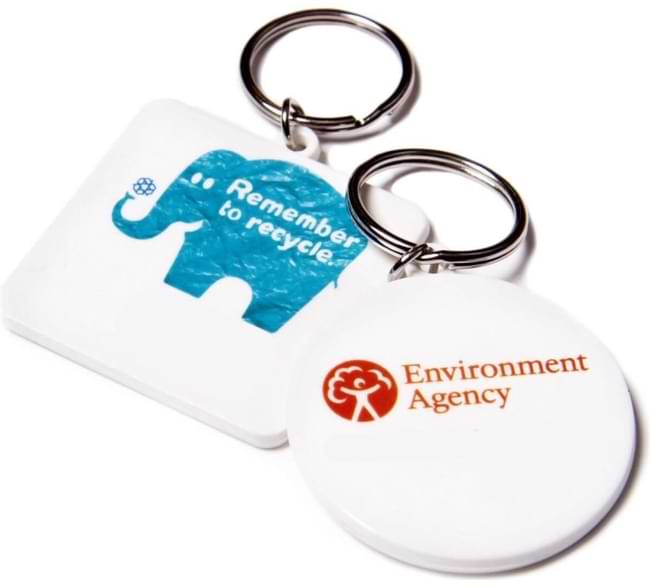
As the world grapples with the environmental challenges posed by plastic waste, industries are increasingly turning to sustainable solutions to reduce their ecological footprint. The traditional production of plastic keyrings contributes to the accumulation of plastic waste. Forward-thinking companies are revolutionising their approach by embracing post-consumer recycled plastics for keyrings. Using post-consumer recycled plastics for keyring production offers environmental benefits and exciting opportunities are presented for businesses seeking to adopt greener practices.
Post-consumer recycled plastics are derived from plastic materials that have already served their original purpose as consumer products and have been discarded. Rather than ending up in landfills or oceans, these plastics are collected, sorted, cleaned, and processed to create new raw materials. Keyring manufacturers can source post-consumer recycled plastics from various consumer products like water bottles, food containers, and packaging materials.
The journey of post-consumer plastics from waste to raw material involves several crucial steps:
- Collection: Plastic waste is collected from various sources, including recycling bins, waste management centres, and community initiatives. This collection process is essential in diverting plastic waste from landfills and reducing environmental pollution.
- Sorting: Once collected, the plastics are sorted based on their type and composition. Different plastic polymers may have distinct recycling processes, making sorting a critical aspect of the recycling journey.
- Cleaning: To ensure the purity of the recycled material, the sorted plastics undergo a thorough cleaning. Any contaminants or residues are removed during this stage to obtain high-quality recycled plastics.
- Shredding: The cleaned plastics are then mechanically shredded into small flakes or pellets. This prepares the material for the next step in the recycling process.
- Extrusion and Forming: The shredded plastics are melted and then moulded into the desired shape for keyrings through a process called extrusion or injection moulding. This forms the basis for the sustainable production of post-consumer recycled plastic keyrings.
The advantages of using these types of keyrings are multifold.
- Using post-consumer recycled plastics for keyrings significantly reduces the demand for virgin plastic production. This, in turn, conserves natural resources, reduces energy consumption, and lowers greenhouse gas emissions associated with the production of conventional plastics.
- By converting discarded plastic waste into valuable raw materials for keyrings, businesses contribute to waste diversion efforts, preventing plastic pollution from ending up in landfills, oceans, or incineration facilities.
- The production of post-consumer recycled plastic keyrings typically requires less energy compared to producing new plastic from scratch. This results in a reduced carbon footprint, making them a more sustainable option.
- Embracing post-consumer recycled plastic keyrings aligns businesses with eco-conscious values, enhancing their brand image among environmentally conscious consumers. Moreover, this sustainable approach presents compelling marketing opportunities for companies seeking to attract and retain green-minded customers.
b. Bamboo Keyrings:
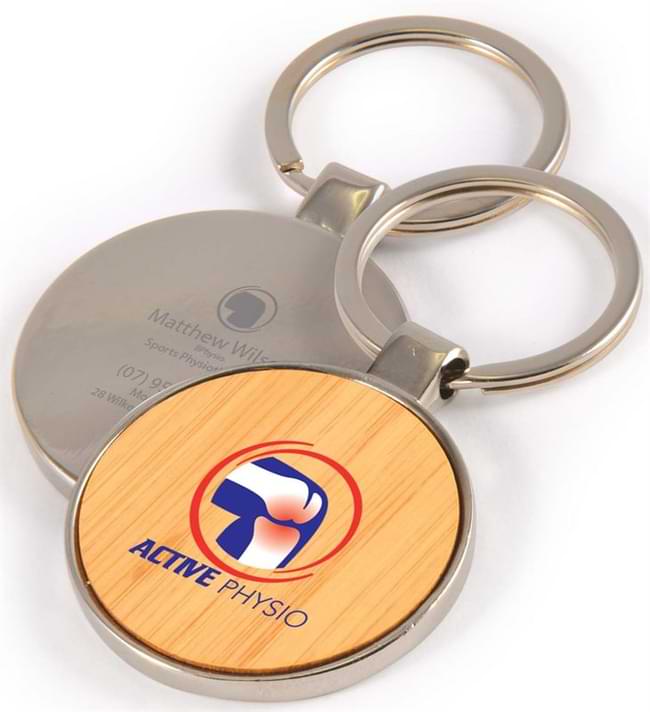
Bamboo keyrings have emerged as a powerful and sustainable choice for hotel promotions, showcasing a commitment to green practices. There are many advantages of using bamboo keyrings for hotel promotions, from the technical properties of bamboo as a material to its positive environmental impact and customer appeal.
Bamboo is a rapidly renewable resource that holds numerous properties, making it an ideal material for sustainable products like keyrings. As one of the fastest-growing plants on the planet, bamboo can be harvested without causing damage to the ecosystem. Its ability to regrow quickly after cutting makes it an environmentally responsible alternative to traditional materials.
One of the technical highlights of bamboo keyrings is their exceptional strength and durability. Despite its lightweight appearance, bamboo is surprisingly strong and resilient. The natural fibres in bamboo contribute to its tensile strength, allowing it to withstand daily wear and tear, ensuring they remain functional and aesthetically pleasing for an extended period.
It also possesses inherent moisture resistance, making it an ideal choice for hotel keyrings. Unlike some other materials that may be susceptible to moisture-related issues such as warping or mould growth, these are better equipped to handle various environmental conditions without compromising their integrity.
They also align with circular economy principles due to their biodegradable nature. When discarded, bamboo products will naturally break down, returning to the soil without causing harm to the environment. This makes them a more sustainable option compared to plastic or metal keyrings that contribute to landfill waste.
Its versatility as a material allows for intricate designs and customisation options, allowing hotels to create unique and aesthetically pleasing keyrings that reflect their brand identity. It can be laser engraved, printed, or treated with various finishes, enabling establishments to creatively showcase their logos, slogans, or other designs.
Embracing them as promotional items reinforces a hotel's commitment to sustainability and responsible environmental practices. Customers, particularly eco-conscious travellers, are increasingly drawn to establishments that demonstrate such values. These keyrings resonate with guests' green sensibilities and create positive brand associations, fostering customer loyalty and positive word-of-mouth referrals.
Lastly, bamboo cultivation and harvesting often occur in rural areas, providing economic opportunities for local communities. Hotels can contribute to supporting sustainable livelihoods and responsible sourcing by choosing these keyrings.
c. Cornstarch-Based Bioplastic Keyrings:
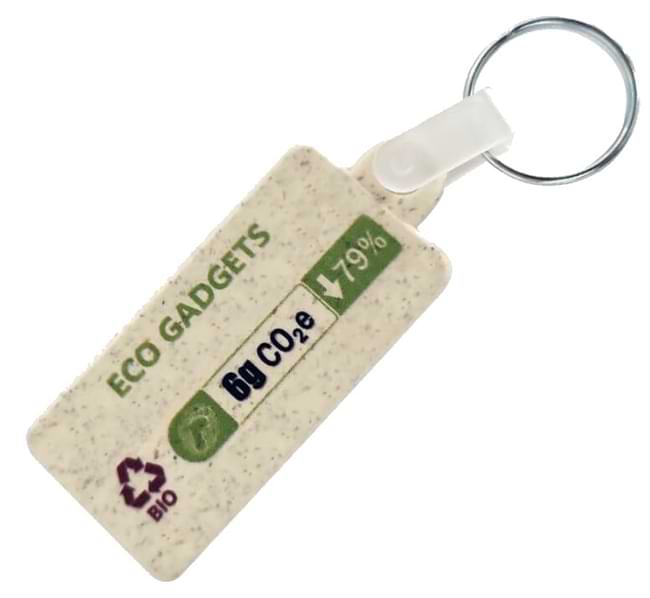
Keyrings using cornstarch-based material have emerged as a technological breakthrough, offering hotels an eco-friendly solution for their promotional efforts.
These bioplastics are derived from renewable resources, primarily cornstarch. The manufacturing process involves breaking down the cornstarch into its individual glucose molecules through enzymatic or chemical processes. These glucose molecules are then fermented by microorganisms, such as bacteria or yeast, to produce polylactic acid (PLA), which serves as the base material for bioplastic keyrings.
This type of keyring offers hotels an exciting creative design and customisation opportunity. Like conventional plastics, PLA can be injection-moulded into various shapes, sizes, and finishes, enabling hotels to craft keyrings that align perfectly with their brand identity. This versatility allows for intricate engravings, embossing, and vibrant colours, making the keyrings visually appealing and engaging for guests.
One of the most remarkable features of cornstarch keyrings is their biodegradability. When exposed to certain conditions, such as composting facilities or natural environments with specific microorganisms, PLA undergoes a complete breakdown into water, carbon dioxide, and biomass. This eco-friendly decomposition process ensures that the keyrings leave no harmful residues behind, significantly reducing their environmental impact compared to conventional plastics.
The production consumes less energy and generates lower greenhouse gas emissions compared to traditional petroleum-based plastics. By opting for these, hotels contribute to reducing their carbon footprint and supporting a more sustainable manufacturing process. Contrary to misconceptions about bioplastics, they exhibit remarkable strength and performance. PLA possesses a high tensile strength and can withstand various mechanical forces, making it durable for everyday use as a keyring.
They also align with circular economy principles, closing the loop by returning to nature after their useful life. Hotels can educate guests about the importance of composting or proper waste disposal to ensure the keyrings follow a sustainable end-of-life cycle. As sustainability becomes a critical consideration for consumers, eco-conscious travellers are increasingly drawn to hotels that prioritise environmentally friendly practices. By offering these types of keyrings as promotional items, hotels showcase their commitment to responsible environmental stewardship, enhancing their brand reputation and attracting like-minded customers.
d. Wooden Keyrings:
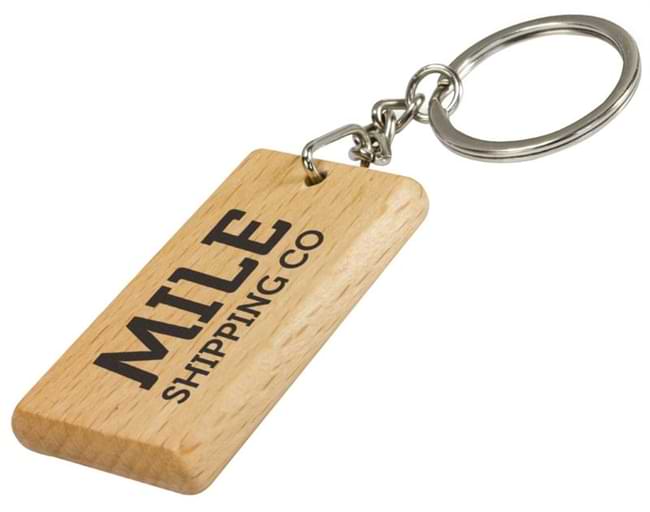
Wooden keyrings have emerged as a timeless and sustainable choice, offering hotels a unique opportunity to showcase their commitment to green practices while creating lasting impressions on their guests.
One of the most prominent advantages of wooden keyrings is their natural beauty and unique aesthetics. Different wood species' inherent texture, grain patterns, and hues create visually appealing and elegant keyrings that stand out from conventional plastic or metal alternatives. They exude warmth, sophistication, and a sense of craftsmanship that resonates with guests, making them valuable keepsakes and conversation starters.
They are sourced from sustainably managed forests or reclaimed wood, making them an environmentally responsible choice. The use of responsibly harvested wood ensures that new trees are replanted to maintain the ecosystem's balance, allowing forests to regenerate and continue providing valuable resources for future generations.
They also offer a low environmental impact compared to plastic or metal keyrings. They require minimal energy for processing and have a relatively smaller carbon footprint during production. When their life cycle is complete, they are fully biodegradable, breaking down naturally without leaving harmful residues, making them an eco-friendly alternative. They can be customised with intricate designs, engravings, or laser-cut patterns, providing hotels with endless possibilities for creative branding. The craftsmanship involved in creating them adds value and authenticity to the promotional item, reinforcing the hotel's brand identity and dedication to quality.
Contrary to misconceptions about wood being fragile, these types of keyrings are surprisingly durable and long-lasting. With proper care, they can endure daily use for years, ensuring that guests will cherish their mementos long after their hotel stay. They are also available in a wide range of shapes and sizes, enabling hotels to design one that reflects their unique theme, location, or architectural style. From classic circles to custom silhouettes, they can be tailored to suit the hotel's branding and message.
The use of them in hotel promotions presents an opportunity to create positive brand associations with guests. Customers appreciate the eco-friendly gesture of receiving a sustainable and biodegradable item, showcasing the hotel's dedication to environmental stewardship. The unique aesthetics and tactile appeal leave a lasting impression on guests, making them more likely to share positive experiences and recommendations with others.
Building a Sustainable Hospitality Brand
As hotels embrace sustainable practices, they position themselves as leaders in the hospitality industry's sustainability movement. Communicating these initiatives through marketing efforts, social media, and guest interactions reinforces the establishment's commitment to environmental stewardship, attracting environmentally conscious travellers and appealing to a broader audience of conscientious guests.
Conclusion
In a world where sustainability is becoming an increasingly vital consideration for consumers, hotels are stepping up to the challenge by adopting eco-friendly promotional keyrings. These small yet impactful gestures demonstrate their dedication to environmental responsibility and align with the values of eco-conscious guests. As the hospitality industry continues to evolve, the use of sustainable promotional items, like eco-friendly keyrings, is a significant step towards building a greener and more responsible future for both the industry and the planet. By incorporating eco-friendly practices throughout their operations, hotels and motels can set a positive example for the broader business community and inspire guests to make sustainable choices during their travels and daily lives.
The Keyrings Only Team

